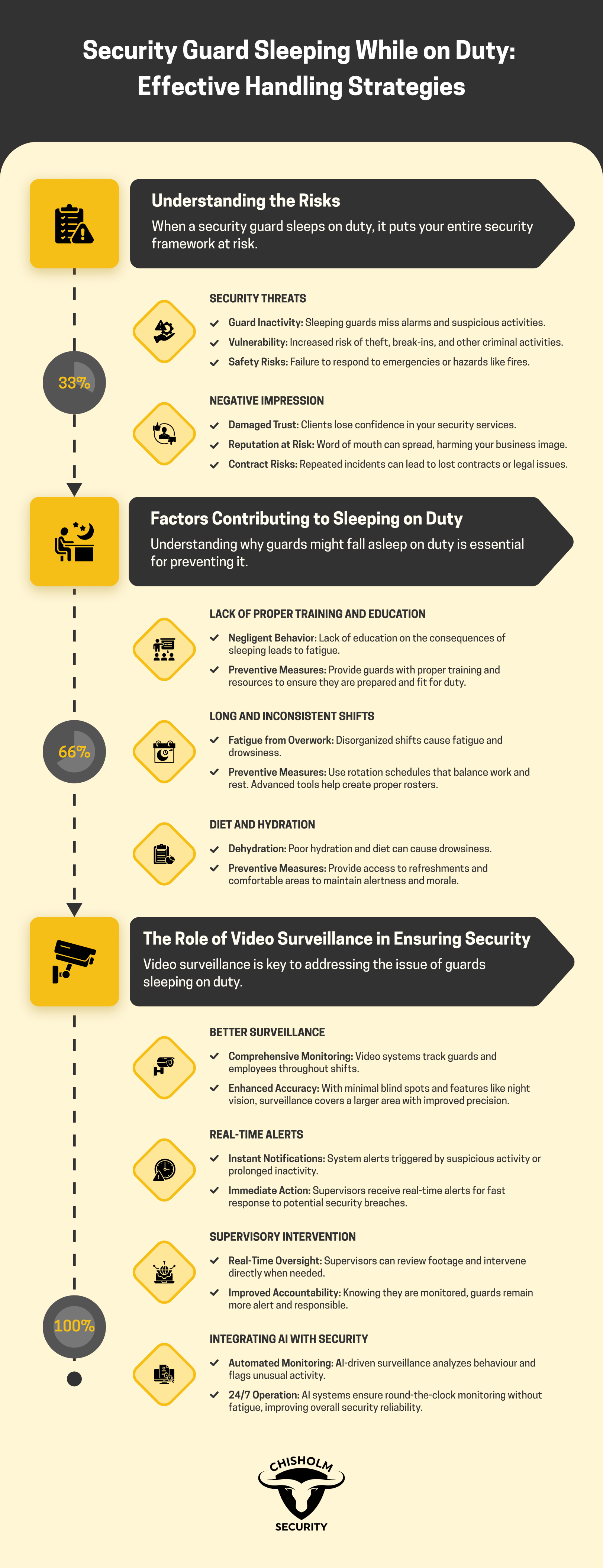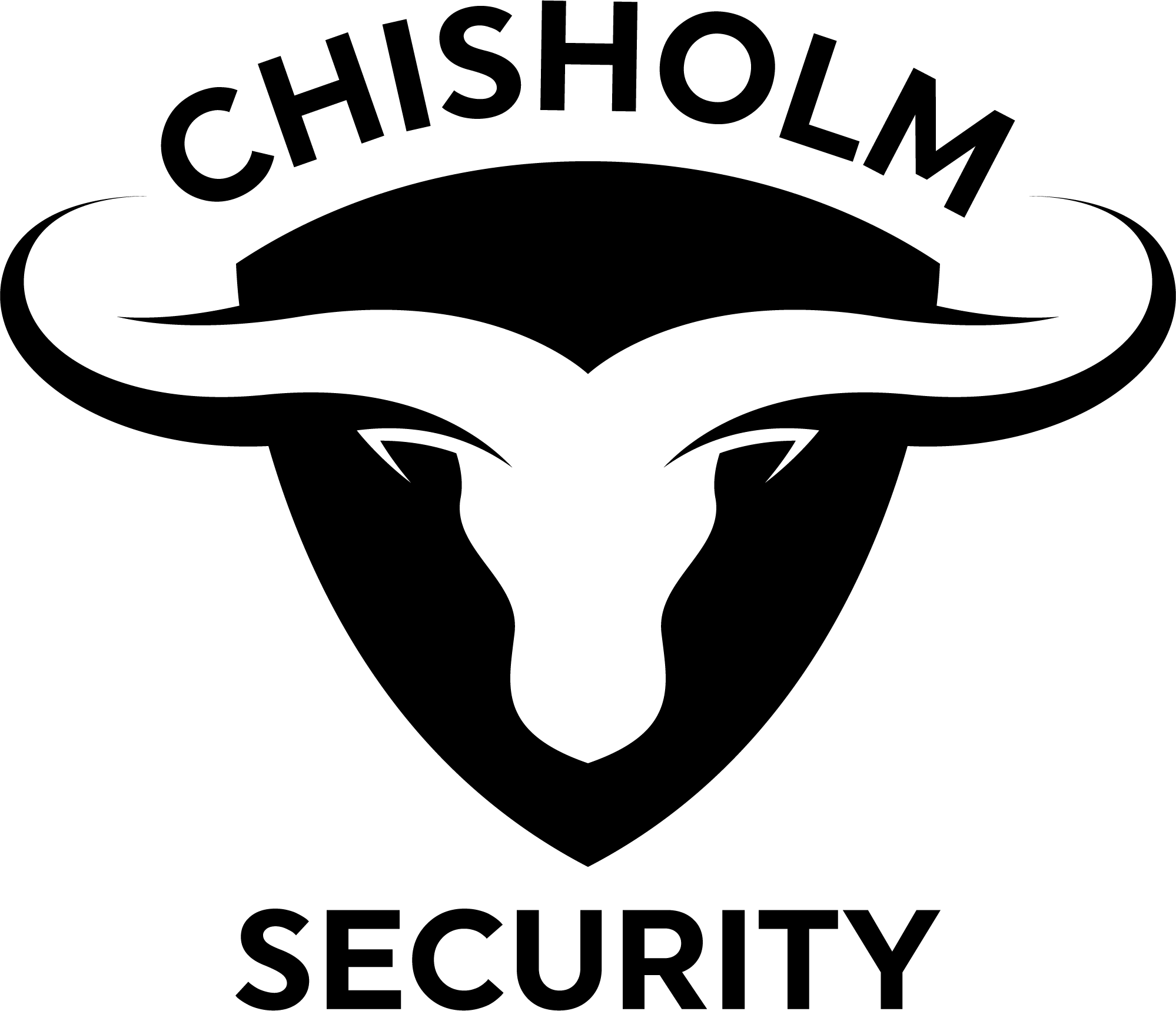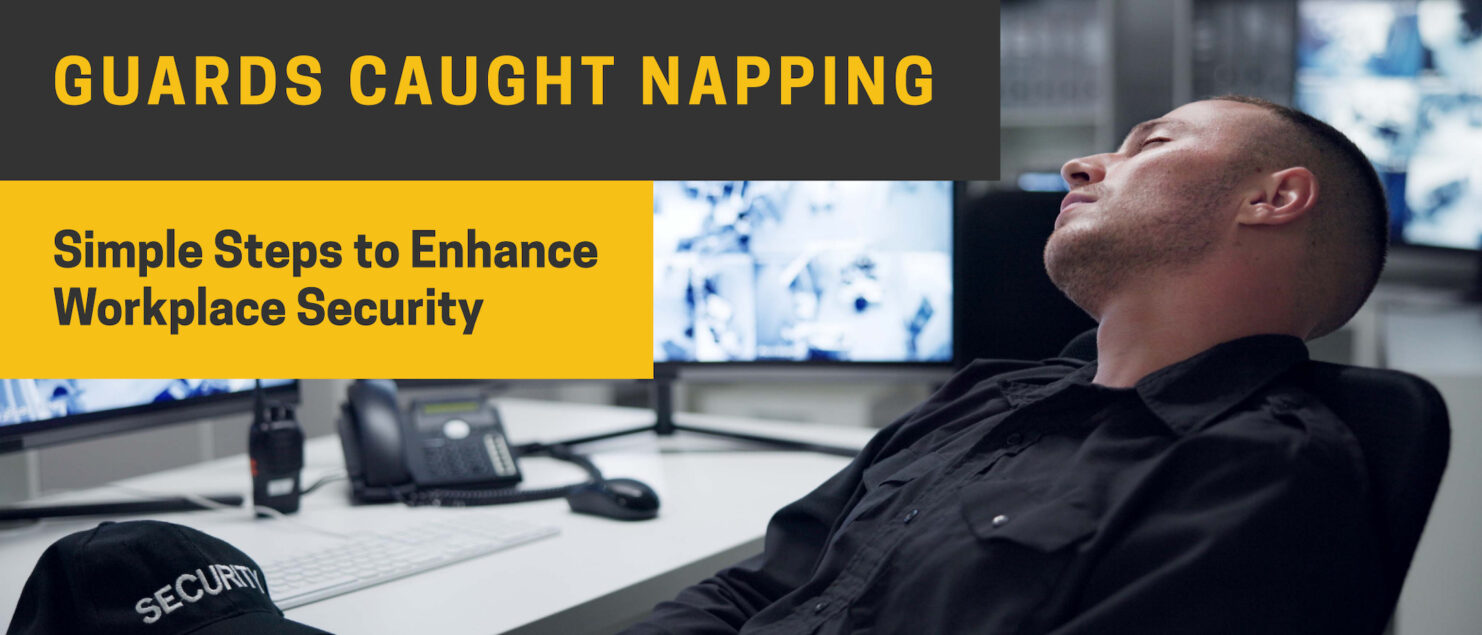Guards Caught Napping? Combat Security Lapses with Advanced Video Surveillance
A robust security system is essential for ensuring safety and maintaining order in any facility. Going by the conventional route and employing security guards has long been the reason for human errors and consequent security lapses. Sleeping guards compromise the security framework and expose vulnerabilities in your premises.
A 2023 study revealed that 58% of security guards working on the day shift and 74% of night shift workers had poor sleep quality. This indicates that sleeplessness is not just an issue among graveyard shift workers but a more general concern among security workers. The study also concluded that nearly half of night-shift workers had insomnia.
Security guards nodding off is a serious security loophole that can threaten a company’s security and integrity. In this article, we discuss the risks associated with such failures and offer actionable steps to enhance workplace security through the implementation of advanced video security systems, like those provided by Chisholm Security.

What are the Risks of Guards Sleeping on Duty?
Security guards failing to perform their duties not only fall short of expectations but also expose your facility and assets to significant risks. Recognizing these vulnerabilities within a failing security protocol is crucial for identifying more effective alternatives.
- Trespassing
One of the obvious consequences of having an unreliable security protocol is the risk of unauthorized access or trespassing. With sleep-deprived security guards put in charge, intruders can easily bypass security, leading to theft, vandalism, and other criminal activities.
- Delayed Emergency Response
Sleep-deprived guards may also miss alarms, fail to respond to emergencies such as medical situations, and overlook potential hazards like fires or equipment failures. This lack of attention can escalate minor security lapses into emergencies, risking everyone’s safety. This can be addressed by utilizing advanced notification systems.
- Loss of Trust
What privacy and confidentiality are to banks, security is to commercial facilities. While this may seem obvious, an unwritten rule that defines a safe workplace is the presence of a reliable security system that clients, customers, and visitors can depend on. A sleeping guard can severely undermine this trust, projecting a negative impression of your services.
- Damage to Reputation
The lack of trust resulting from haphazard safety measures can trickle down to your transactions leading clients to question your reliability and professionalism. Word-of-mouth spreads quickly, and a single incident can negatively affect your organization, making it harder to attract new clients or, worse yet, retain existing ones.
- Legal Liability
Security lapses could lead to legal action, fines, or other penalties. Repetitive security breaches may lead to contract terminations or severe legal ramifications, putting your organization in a vulnerable position. Assuring clients, customers, and employees of a safe and comfortable environment helps retain their confidence and loyalty.
Why Are Security Guards Struggling to Stay Alert?
Addressing the issue of a security guard falling asleep involves identifying root causes and implementing comprehensive security strategies, where video surveillance systems such as those offered by Chisholm Security play a critical role in enhancing guard performance and accountability.
Commonly reported causes of watchmen falling asleep on duty include:
- Lack of Proper Training and Education
Lack of proper education on the causes and consequences of negligent behavior is one of the main reasons for guards falling asleep on the job. Ensuring that guards are properly briefed about their roles, and are fit for the job addresses this concern effectively. Resources on security training practices can enhance their readiness.
- Long and Inconsistent Shifts
The lack of a proper roster and well-structured breaks, especially in high-stress environments, is a common cause of on-duty drowsiness. Disorganized shifts can lead to employee overwork and resulting fatigue.
Employers should implement well-organized rotation schedules that balance work and regular rest periods for each worker. Advanced scheduling tools can be useful in creating appropriate duty rosters. A proper balance can be achieved by alternating guards between less demanding posts and more critical areas.
- Diet and hydration
Nutritionists say that dehydration is a common cause of drowsiness. In the security profession, maintaining a healthy balance in terms of diet and sleep is crucial for proper functioning. Equipping areas with comfortable seating and facilities for light refreshments can further support alertness and morale on duty.
- Stress
Workplace stress was also found to be a common contributor to security guards’ inattentiveness while on duty. This can be minimized by promoting proper communication, implementing up-to-date security tools, providing fair compensation, and organizing workflows.
The Role of Video Surveillance in Enhancing Security
Video monitoring solutions can address the issue of security guards sleeping on duty by enhancing surveillance, providing real-time alerts, enabling supervisory intervention, and automating emergency notifications. Video surveillance systems may serve as complementary security systems or may entirely replace the security workforce.
Researches confirm that the mere presence of a video surveillance system is sufficient to deter crimes, proving its effectiveness for commercial applications. Advanced surveillance systems provide an additional layer of security for companies that otherwise lack a comprehensive security infrastructure.
With a dependable and well-planned surveillance system designed by professionals, security threats and trespassers can be kept at bay. Here are some benefits of incorporating such robust video surveillance and emergency notification models:
Eliminates the Risk of Fatigue
Sleeping guards become a significant issue primarily when relying on conventional security methods, which often lack modern preventive measures and technologies. While human guards play an important role in security, integrating video security systems ensures continuous vigilance.
For instance, technologies like Chisholm Security’s virtual guard services provide 24/7 monitoring without the risk of fatigue, offering a reliable solution to potential security threats caused by an overworked security guard.
Better Surveillance
Commercial video monitoring systems can be integrated into the security protocol of an organization in multiple ways. They can help monitor security guards or other employees throughout their shifts, perform security operations better, and provide continuous surveillance footage over a larger coverage area.
In addition, modern video monitoring systems feature minimal blind spots resulting in less operational errors and improved accuracy. With features like night vision and motion detection, the overall quality of surveillance improves, making it harder for suspicious activity to go unnoticed.
Real-Time Alerts
Real-time alerts play a crucial role in addressing security concerns. With proper integration offered by professionals like Chisholm Security Services, these alarm systems can be configured to notify the user of suspicious activity, critical environmental changes, and anomalies in previously recognized trends.
Detection algorithms can even identify when a guard remains stationary for too long or appears to be sleeping. These alerts can be sent to supervisors via apps or directly to control room dashboards, allowing for immediate action. This proactive approach significantly reduces response times to potential security lapses.
Supervisory Intervention
Supervisory intervention is essential for maintaining security integrity. With video monitoring, supervisors can review surveillance footage and track real-time activities. Safety systems can be programmed to provide a medium for supervisors to communicate directly with guards, workers, and potential intruders.
Supervisors can further personalize these tools to improve security workers’ accountability. The presence of a video monitoring system can enhance vigilance among watchmen by providing accountability and ensuring their performance is continually observed.
Integrating Artificial Intelligence with Security
The integration of artificial intelligence with security systems like Visual Sensor Networks elevates surveillance by automating monitoring tasks. AI can analyze patterns and predict potential violations, thereby reducing reliance on human supervision. This technology can identify unusual behavior and flag it for review instantly.
Using apps and remote guarding solutions increases efficiency as systems operate 24/7 without fatigue, providing an added layer of reliability and security to the monitoring process. In cases where manual security measures fall short, these automated systems can operate seamlessly.
What Does a Powerful Security System Look Like?
When properly implemented, video systems can not only complement the manual security workforce but also replace them. In modern security strategies, particularly in commercial settings, integrating video systems accompanied by automated notifications, intelligent thermostats, and mobile app support has become a standard.
To ensure your premises meet these standards and your guards are fully supported, consider integrating Chisholm Security’s state-of-the-art video surveillance systems. Contact us today to learn how our solutions can help you maintain a vigilant, effective security operation.” Our intrusion alarm systems, video monitoring solutions, and access control measures are sure to help you avoid severe security lapses in your commercial facilities.

